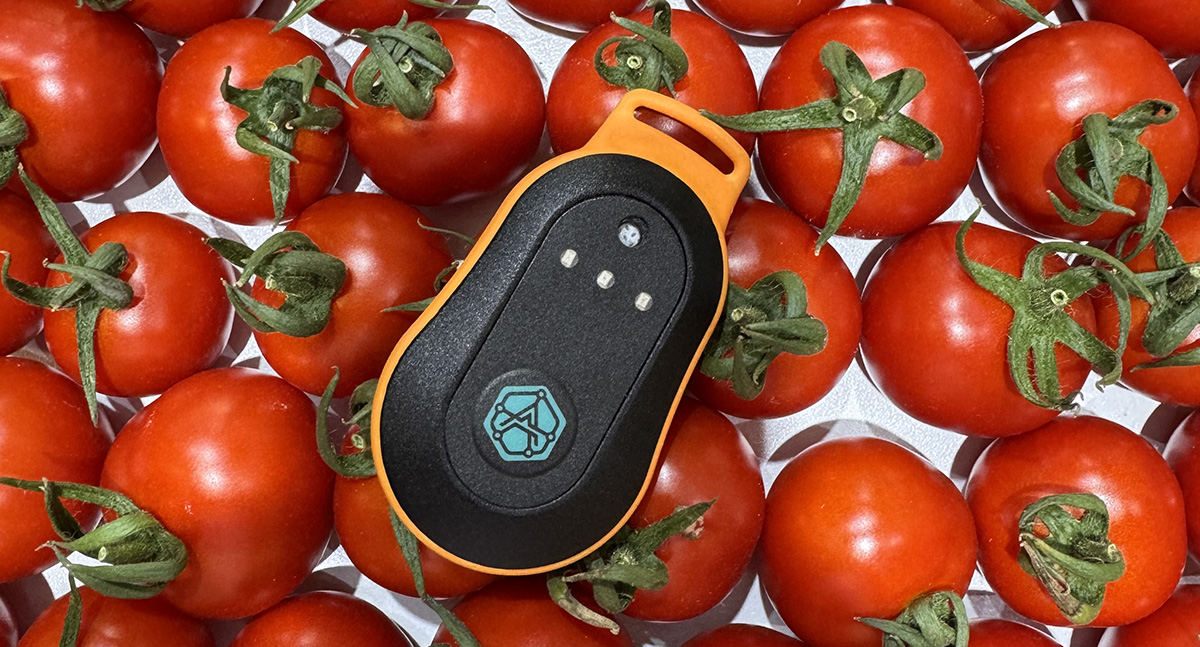TomatoGuard, a pioneering research and development project aims to introduce an advanced monitoring system that harnesses AI to enable early detection and management of crop stress.
TomatoGuard
With funding from DEFRA and Innovate UK, the ‘TomatoGuard: Advanced AI-Driven Pest and Stress Detection for Sustainable Tomato Cultivation’ project aims to revolutionise protected crop production by making it more sustainable and efficient.
This collaborative effort brings together expertise from the UK Agri-Tech Centre, Altered Carbon (AC), Fargro Limited and prominent commercial tomato producer APS Produce. The project focuses on developing machine learning capabilities to detect specific tomato volatiles indicative of stress.
At the heart of this project lies AC’s AI-Assisted Digital Nose sensor system, a cutting-edge tool designed to emulate human senses and identify potential horticultural challenges in plants and soil. Using a graphene-based sensor array, the Digital Nose detects specific gases and vapours, acting as an early warning system for environmental changes that signal the onset of crop stress.
This system is powered by AC’s K9sense chip, a new type of chemical sensor that operates within an AI framework. It identifies unique patterns of volatile organic compounds (VOCs) released by stressed plants, enabling interventions before visible symptoms occur.
Early detection for sustainable production
The ability to detect crop stress early allows growers to take targeted actions, reducing pesticide use, limiting crop loss and promoting sustainable and economically viable production systems.
AC also aims to lower the carbon footprint of running a protected cropping system by detecting plant and soil stress signals for fine-tuning the environment’s heating, humidity and ventilation.
Targeting Red Spider Mites (RSM)
To ensure measurable impact, the project focuses on Red Spider Mites (RSM), a significant pest in tomato cultivation. Although biological treatments are available, their effectiveness improves dramatically with early identification. Due to environmental, food safety and commercial concerns, many chemical treatment options have been withdrawn in recent years. TomatoGuard combines supervised learning for RSM detection and unsupervised learning for anomaly detection to address this challenge.
Expert insights
Dr. Andy Evans, Innovation Lead for Crop Health at the UK Agri-Tech Centre, said:
“The outcomes from this project will lead to the detection of issues arising within tomato crops at a very early pre-symptomatic stage, allowing interventions to be deployed in the areas where issues are arising.
From a grower perspective this would cut down on costs due to unnecessary pesticide use by targeting the areas that need treatments, optimising the nutritional requirements of the crop and maintaining a high quality and yielding product.
The system has the potential to be applicable in a wide range of protected cropping systems.”
Detelina Vassileva, Chief Operating Officer at Altered Carbon, said:
“Our mission is to improve life on Earth by digitising the sense of smell.
Food loss is a huge issue affecting 30% of all that we produce worldwide, and it is during crop production that we can have the biggest impact.
We are hoping to expand on this one pest, and one crop, into many more and have real measurable impact on the quality and quantity of the food that is produced worldwide.”
Lori-Leah Griffiths, Technical and Regulatory Specialist at Fargro Limited, said:
“Fargro’s role in the TomatoGuard project is centred on providing expert agronomic advice to guide the development of this innovative technology and independently monitor commercial trials to ensure its practical application for growers.
By combining our deep horticultural expertise with advanced sensor technology, we aim to deliver solutions that empower growers to act early, target treatments effectively and ultimately improve both environmental sustainability and economic outcomes.”
Brian Moralee, Growing Manager at APS Produce, commented:
“We believe that this new technology should increase our effectiveness of identifying pests and crop stresses at a much earlier stage, which will allow earlier interventions with cultural and biological controls.
We hope in turn, that this will reduce our ever-increasing costs and help us meet our goals of more sustainable production.”
Next steps
While initially focused on tomatoes due to their economic importance and agronomic complexities, the technology is adaptable and scalable. It holds potential applications in other protected cropping systems, such as vertical farming, further expanding its reach.
To ensure reliability, TomatoGuard is undergoing an extensive testing program that includes:
- Controlled environments at Rothamsted Research
- Glasshouse trials at Stockbridge Technology Centre (scheduled for Spring 2025)
- Commercial trials at APS Produce’s growing facilities
This robust testing strategy ensures the technology meets real-world farming needs and delivers practical results.
Initial trials are already underway in glasshouses and controlled chambers at Rothamsted Research. Larger-scale testing at Stockbridge Technology Centre is planned for Spring 2025. APS Produce will further evaluate the sensors in a commercial glasshouse setting, providing valuable feedback for the technology’s commercial application.
